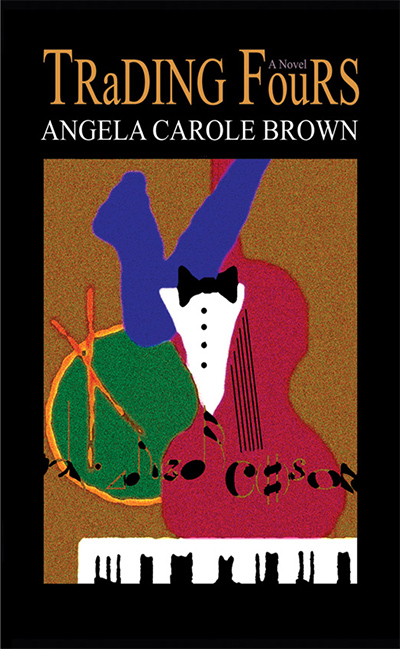 Trading Fours
Trading Fours
Trading Fours by Angela Carole Brown was one of my most enjoyable and compelling reads in this year's contest. Brown's novel about Los Angeles musicians whose lives revolve around setting up gigs and making ends meet is a smart commentary about being a talented, struggling artist chasing success in a system that propels only a few musicians to stardom.
It's also a critical commentary about workers' rights. The characters here mostly work "casual gigs"—weddings, bar mitzvahs, birthday bashes—without benefits, vacation time, or job security. Main characters Tristan, Nick, Julian, Chloe, Seth, and Hayes experience the effects of decades spent in the "gigging" economy: hearing loss, injuries from lugging and setting up equipment, financial stress, and artistic boredom from being constantly asked to perform popular songs like "Tie a Yellow Ribbon". All this takes place in environments where alcohol is flowing and the wedding guests may be rude, drunk, and unreasonably demading. Even the characters in the story who achieved some level of fame experienced significant hardships and health effects before and after achieving success.
Full disclosure: I grew up in a small working-class town and unfortunately had little to no access to music education. I never picked up an instrument or learned to read music. As a contest judge, I worried that my lack of musical knowledge would make this novel boring or incomprehensible to me. But the writer describes the music scene with such vivid, accessible language that I was able to enjoy this book about music, in much the same way that a non-lawyer can enjoy a courtroom drama without understanding every legal nuance. This personal enjoyment was made possible by compelling characters, sharp dialogue, interesting plot twists, and a strong writing style. I didn't understand every musical reference but that didn't matter at all.
This book has the potential to be a compelling film, and I wish the author had been able to secure a mainstream publisher and wider readership. The book was well edited with almost no errors. The grammar and rhythmic pacing were solid. There were a few stylistic tics, including capitalizing words such as Hell throughout the book.
Several male characters tended to focus their internal gaze and private musings on women's bodies. Sometimes these musings took place in a context that revealed aspects of the characters' emotional states; at other times, it felt gratuitious and pulled me out of the plot. One of our screeners noted that "some of the author's characterization of female characters was a bit one-dimensional." I agree with that assessment.
The author could have fleshed out the role of women in the LA jazz scene by including more than one major female character. Chloe's storyline was very compelling and served as the moral compass of the story. But perhaps the dominant role of men in the novel was a purposeful commentary on the situation of women in the jazz scene.
The book was attractive with an evocative cover, strong binding, and readable font and formatting. I would welcome a sequel to this novel, and look forward to the next book by this winning author.









